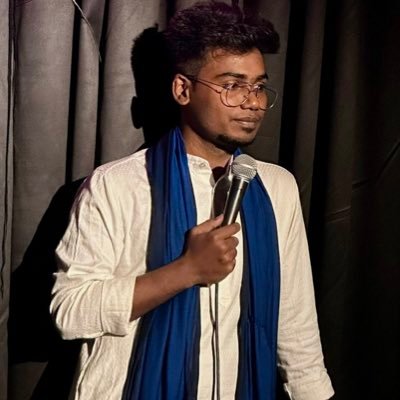Meet Manjeet Sarkar: The Anti-caste Comedian

Aatika S. | TwoCircles.net
Humour is often associated with comic enjoyment. The question of whether that enjoyment comes from subjugation or incongruity is rarely spoken about. Manjeet Sarkar, an anti-caste comedian, talks to TwoCircles about similar themes in comedy in India like conflicting humour, dangerous consequences of comedy in today’s era, and much more. Born in a village on the border of Chhattisgarh and Odisha, Manjeet, aims to fill the void of an anti-caste discourse in the Indian comedic setup.
Manjeet faced the structural barriers created by caste and class from his childhood years. The mid-day meals were a key reason for him to attend classes. He had horrible experiences of caste-based discrimination when he lived in a government hostel during the higher-secondary schooling days. While he wishes that none should be subjected to those experiences, he believes that it is from those lived experiences, that he draws his strength today as an anti-caste comic.
Inspired by African-American Comedy Culture
Through Youtube, he discovered Dave Chappelle, Patrice O’Neal, and other Black comedians, and he found his voice resonating with them. His discomfort with English did not deter him from listening and understanding the black comedy culture. This inspired him to bring out a Dalit narrative in Indian comedy.
“I have so many stories and most of my stories are unheard. The stories of all other comedians are funny but a lot of them sound the same because the experience is the same”, says Manjeet.
On the Art form
“Anti-caste comedy is not a specific genre, but rather it is like what Black comedians do. Black Comedy came about when Blacks started telling their stories. When they took to any art form like music or comedy, unfortunately, it got labeled as “Black comedy” or “Black music.”
Manjeet describes comedians as attention-seeking whores and believes that they should not be put under the scanner all the time. When asked about the prevalence of misogyny in anti-caste comedy, he replies that comedy is necessary to start uncomfortable conversations whether it be on gender, sexism, caste, etc. For this, he draws his reference from Dave Chappelle’s commentary on trans individuals. “Expecting comedians to talk sense, does not make any sense to me. There are opinions that comedians have because they watch and read a lot and constantly deal with loneliness and chronic depression and try to make a few things funny, but you can’t please everyone”, says Manjeet.
Talking about the shrinking space of political comedy in India, Manjeet asserts that comedians are always in the first line of being attacked by the State as a measure to curb any form of dissent.
He criticizes the rise of "cancel culture" and the increasing possibility of being attacked by the Right or the Left for his display of art. He further talks about how people nowadays get offended by anything and everything which makes a comedian’s job harder. He admits to self-censoring while performing his art due to the fear of dire consequences and even legal penalties.
Favorite Comedians
Manjeet candidly admits to not finding many Indian comedians funny for his liking. However, he is appreciative of Varun Grover for his political comedy. He also mentions Kelt Shresth, Joteen Patro, Sumit Anand, Ajai Rathore, and Manik Mahana as a few of the ones he enjoys.
Barriers and Challenges
Apart from the structural institutions of caste and class, that limit access for marginalized communities, Manjeet describes how lack of fluency and comfort in the English language becomes a huge challenge to overcome for a new entrant. It made him feel inferior in front of the crowd he had to perform for. This inferiority complex inadvertently becomes a part of personality and it takes a certain amount of courage to come out of that.
Manjeet believes that the Bangalore comedic fraternity is more inclusive in comparison to other major comedy hubs i.e., Mumbai, which he feels is quite structurally classist and non-inclusive. He talks about how he enjoys the roast form of comedy that Bangalore comics regularly engage in, which gives him added motivation to write and push to be better.
Manjeet has a problem with the portrayal of his story as only a sad story. “Media only wants the sad part. I have a problem with the tone. You don’t need to make me look sad. I am not sad about my past. I am proud of the fact that I came over it and everyone should be inspired by that,” says Manjeet.
On being asked about his ambitions, the artist talks about the inspiration he draws from the series, Def Comedy Jam. He aims to create a similar collective for Dalit Artists in India where not just comedians, but Dalit rappers and visual artists are provided support in terms of mentoring and guidance.
Manjeet and his comedy come across as a breath of fresh air in today’s time when politically divisive statements become punchlines against minority communities and humourists continue to face severe repercussions for their performances and content.
